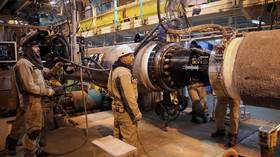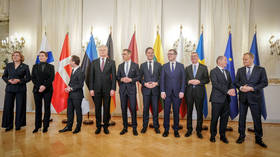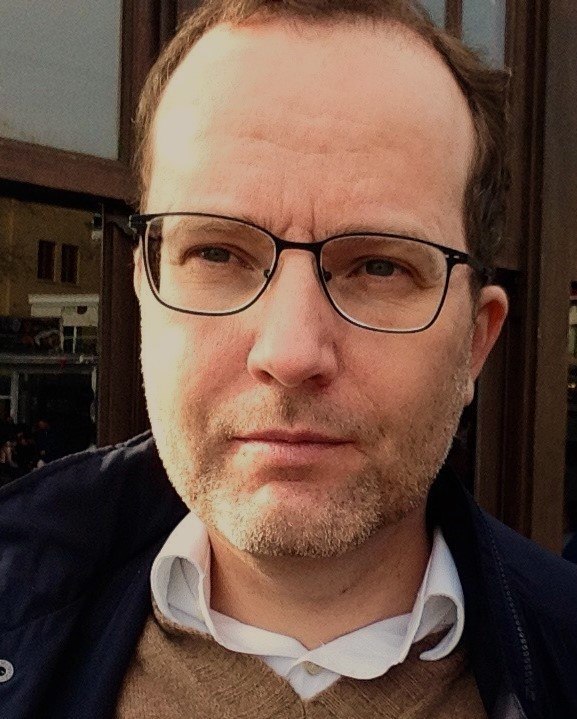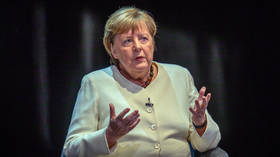Please read my comments between these two stories
Moscow slams West for ‘fantastic hypocrisy’

The West is spinning incidents in the Baltic Sea as purported evidence of a Russian threat, while putting a smoke screen over real attacks that undermine European energy security, Russian Foreign Ministry spokeswoman Maria Zakharova said on Thursday. The EU and NATO have alleged that Moscow was behind cases of Baltic sea power and communication cables being damaged in recent months.
Western officials have argued the incidents justify bolstering NATO's regional presence and sanctioning the so-called ‘shadow fleet’ – ships allegedly involved in Russian oil exports in defiance of unilateral restrictions issued by Western nations.
Western claims that Moscow is waging a sabotage campaign in the Baltic Sea fit a wider pattern of baseless accusations against Russia, Zakharova said. She told a regular media briefing: “Accusations directed against our nation are being habitually voiced before the circumstances of what had happened are established. We have seen this many times.”
She accused the West of “fantastic hypocrisy,” pointing to what she described as the “non-investigation” of the September 2022 attack on the Nord Stream pipelines. The energy links built under the Baltic Sea were intended to deliver Russian natural gas directly to Germany, before being blown up in what Moscow calls a “terrorist attack.”
The US benefited the most from the incident and was likely behind it directly or through a proxy, Russian officials have claimed. In early 2022, US President Joe Biden declared that “there will be no Nord Stream,” if Russia used military force against Ukraine.
Zakharova criticized Brussels for swiftly demanding action against Russia over the cable incidents after showing no such reaction to the Nord Stream sabotage. “It seems that since Biden said that he would destroy this project, the EU believes that what happened was all proper,” she said.
She also condemned the EU for reacting meekly to Kiev’s drone attack on a Russian compressor station last week. The facility pumps natural gas under the Black Sea to Türkiye and multiple consumers in Southern Europe.
Attacks like that are seemingly being “condoned by the part of the EU, which has been acting against the interests of their own people for many years,” she stated. Such people would rather stoke fear in Europe over the “myth” of supposedly dangerous Russian ships than address genuine security threats, she added.
==================
While Greta and other fools get hysterical about carbon entering the atmosphere, American LNG, because of its intensive extraction process and shipping across the Atlantic creates a carbon footprint that is many times larger than Russian pipeline gas all over Europe. Greta, why don't you calculate how much carbon that involves?
And now, after no investigation of the Nord Stream pipeline sabotage, NATO wants to increase security in the Baltic Sea. Security that will make the filthy war industry oligarchs even more filthy, and will end up costing Europeans even more money and increasing pollution from ship traffic in the Baltic and EU ports.
It seems that whoever is pulling the political strings in Europe (Great Scot, I've forgotten his name or initials), is amazingly successful at getting the stupidest people in the world to run them. Fortunately, some voters are waking up to this reality even as democracy is being circumvented by far-left oligarchs and other fools.
===============================================================================================
Will Trump blow up another Russian pipeline?

On January 11, nine Ukrainian drones attacked the “Russkaya” compressor station near the town of Anapa in Russia’s Krasnodar Region. The station, situated on the north-eastern coast of the Black Sea, is a key installation in the TurkStream gas pipeline that crosses the Black Sea’s seabed to emerge on land again north of Istanbul.
To be precise, TurkStream consists of two parallel pipelines, just like the Nord Stream 1 and 2, which used to link Russia and the EU. Most of these two trans-Baltic pipelines were destroyed in a massive act of eco-terrorism; the perpetrators are certain to have included Ukraine and the US, in one way or another.
The attack on the compressor station did not achieve its aims. Russian air defenses shot down the drones, and despite some minor damage, the station remained intact. However there were important consequences, and this story is far from over.
Three days after the Ukrainian strike, Russia’s Foreign Minister Sergey Lavrov accused Washington of being behind Kiev’s assault. In particular, Lavrov charged that the US is seeking to demolish TurkStream, just as it made sure Nord Stream was taken out of commission. If Lavrov is right, the unsuccessful January 11 drone attack could turn out to have only been the beginning: Further attacks may follow, perhaps including an underwater bombing of the pipelines, as was carried out against Nord Stream in September 2022.
Context is essential here: At the beginning of this year, pipelines carrying gas from Russia via Ukraine to the EU were switched off after Kiev refused to prolong a transit agreement.
That has left TurkStream the only remaining pipeline sending gas from Russia to, ultimately, the EU, in this case mostly Hungary. Importantly, Lavrov believes that the US is aiming to have its Ukrainian clients sabotage this last remaining link, not only to hit Russia but also in order to fulfil the broader strategy of disrupting the EU’s economies.
It's interesting that the very conservative PM of Hungary, Viktor Orban, has just announced that he will not be attending the inauguration of President Trump next week. Is that decision connected to the fear of America blowing up Turkstream and leaving the landlocked Hungary in a very difficult position?
It is true that we won’t know for certain whether there is a dedicated US project to sabotage TurkStream and, if so, how far it will go – unless, of course, we wake up one morning to learn that “mysterious” explosions have occurred at the bottom of the Black Sea. In any case, Lavrov’s reading of the situation and warnings – not made for the first time – are plausible and should be taken seriously as a matter of due diligence, especially by Washington’s so-called European partners, that is, vassals.
This is so for several reasons: First, what happened to Nord Stream showed that the US and Ukraine accept no limits, even and perhaps especially among “allies.” Even more important is what happened after their Nord Stream attack, namely, in essence, nothing, at least to them. Instead, there was a prolonged period of falsely (and absurdly) blaming Russia, while the Europeans frantically helped cover up their “friends’” assault as best they could.
When that strategy of denial and disinformation became untenable, some Ukrainians were officially blamed but, as it happens, never apprehended – with the convenient side effect of letting Washington off the hook entirely. It’s a story that makes no sense, but then, making sense is not a thing Western elites and mainstream media consider obligatory. In any case, their failure to defend national interests and retaliate against a brutal attack on those interests can only have emboldened the perpetrators.
Then there is Donald Trump, of course. The returning US president’s explicit policy of making the US “energy dominant” has various domestic aspects, from privileging the fossil fuel industry, which has contributed greatly to his campaign funds, to degrading environmental standards. But it also has foreign policy implications. One is the fact that Trump is continuing and escalating his predecessor Joe Biden’s policy of making the European vassals buy expensive American liquefied natural gas (LNG).
Trump wants them to take even more LNG, using the threat of punitive tariffs as a very American-style sales argument. In essence, this is just the latest phase of that other economic war that Washington has waged: While the one against Russia has backfired quite spectacularly, leaving Moscow stronger and more resilient than before, this one, against Washington’s own NATO-EU vassals has been successful.
Comparatively inexpensive Russian energy has been replaced with expensive American (and other) substitutes – as of 2021, 47 percent of the EU’s gas supplies still came from Russia, for instance. The Europeans have submissively crippled themselves economically and greatly reinforced their dependency on the US. From Washington’s brutally selfish perspective, what’s not to love? At least as long as the Europeans do not rebel. And it seems they never will, astounding as that is.
Finally, there is a broader but no less pertinent context. Lavrov made his remarks about the danger to the TurkStream pipelines at a much longer press conference, which was dedicated to a review of Russian diplomacy in 2024. Against that backdrop, he also restated his views on Washington’s general approach to other countries and, really, the world as such. His crucial point in this regard was that America is not interested, in principal, in equality between sovereign states, balance between their interests, or fair competition between their economies.
Instead, we can add, it keeps pursuing what Americans themselves call “primacy” and what the rest of the world experiences as a relentless policy of domination, intimidation, interference, and continual, usually extremely destructive, warfare. The US, Lavrov summed it up, does not accept any “competitor in any sphere.” We might add again, under any conditions, except when it is compelled to do so.
Is there anything remotely Christian in America's supreme hegemony policy?
Washington’s ruthlessness – and lawlessness – in controlling energy resources and infrastructure and, if necessary, in destroying them, too, is merely one aspect of this strategy. A strategy that seems so deeply ingrained in the collective mind of America’s elite that they cannot even imagine a less confrontational approach to their neighbors on planet Earth anymore. If Trump intends to “make America even greater,” Lavrov warned, the world will have to pay close attention to the methods he will employ to do so.
One test will be what will happen – or not – to TurkStream under Trump. If it should go the way Nord Stream went under Biden, that would be more – if unsurprising – evidence that, ultimately, it makes little difference to the rest of us who is in the White House. Because in America you can have any foreign policy – as long as it’s bossy.










